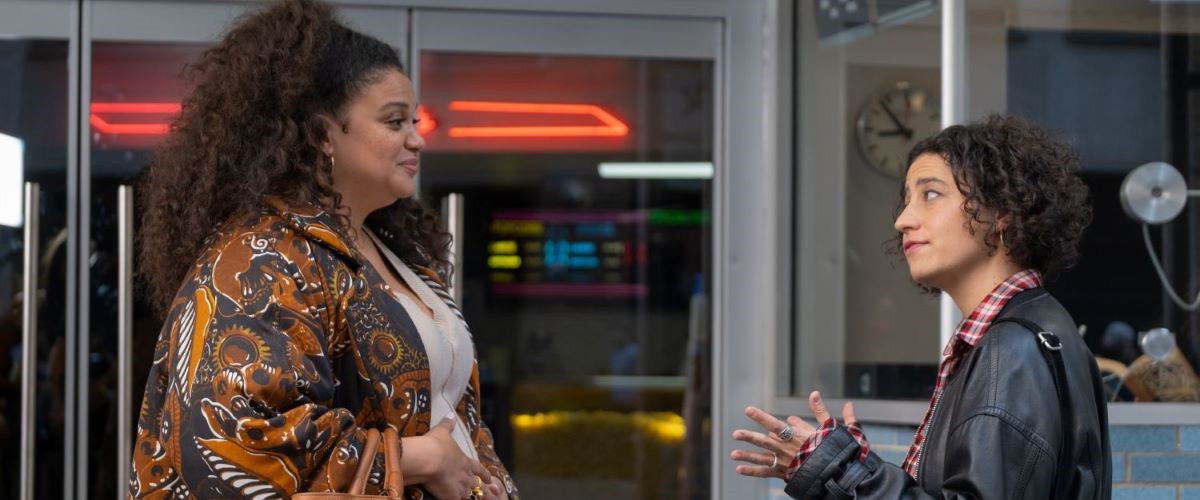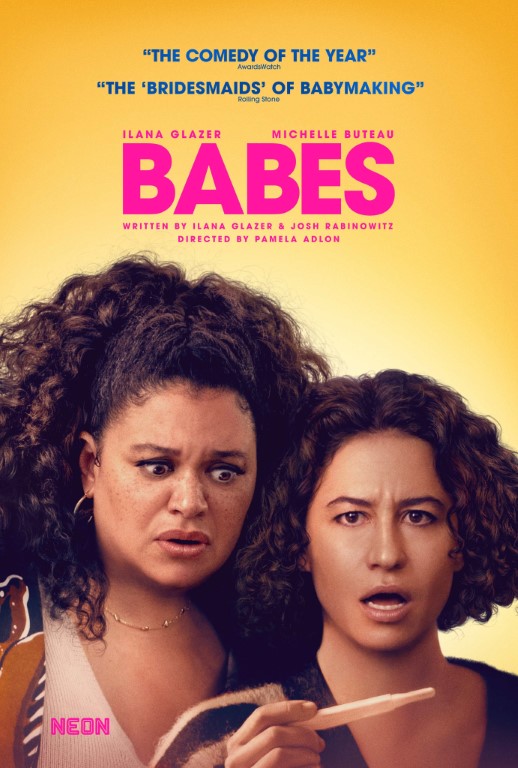The foundation of most comedy is the gulf between our belief that we can control our bodies, words, and relationships and the reality that, most of the time, they’re uncontrollable messes. “Babes” explores that gulf with exuberant joy, endearingly vulnerable characters, and performances filled with heart and charisma. Also with every possible bodily function and fluid.
This is a smart and loving movie about female friendship. But before I get to the women, I want to say a word about what a pleasure and relief it is that it does not in any way trash the men. The central male characters, in every way, love, support, understand, and deserve the fabulous women in their lives. Another man struggles with mental illness but makes his sincere feelings clear. The women are not bonded over some litany of complaints about guys who can’t commit or who call taking care of their children “helping.” I love how this film is so capacious in its affection for its characters that it does not need to diminish any of them.
Dawn (Michelle Buteau) is a dentist with a devoted husband (Hasan Minhaj as Marty), a four-year-old son, and, as the movie begins, she is about to go into labor with a daughter. Her best friend since they were 11 years old is a yoga instructor named Eden (Ilana Glazer, who co-wrote the film with her “Broad City” colleague Josh Rabinowitz).
Buteau and Glazer give Dawn and Eden the kind of effortless rhythm that comes from knowing each other down to the cellular level. Their connection is more than just support—they are each other’s most enthusiastic cheerleaders. It comes from a combination of history, chemistry, and intimacy that rejoices in endless and fearless curiosity about the most minor and trivial details of one another’s lives. When Dawn and Eden go to a movie on Thanksgiving morning for the 27th year in a row, and it seems like Dawn is leaking amniotic fluid onto the seats in the theater, Eden peers into Dawn’s perineum to confirm that, in fact, her water has broken, and it is time to go to the hospital. Eden is there for the birth, as well. Dawn and Marty would expect nothing less.
Eden then becomes unexpectedly pregnant after a one-night stand with Claude (a dreamboat played with effortless charm by the winning Stephen James). But he is quickly and permanently out of the picture, and Dawn promises to be there for Eden as they have always been for each other. Still, we can see some ambivalence in Dawn’s face when she assures her friend that she will be up to single motherhood, even when Eden does not. Eden may not hear the slight frostiness in Dawn’s voice when she corrects Eden for calling herself a “Black mother” (“You are not a Black mother. You are having a Black child”), but we do.
Dawn and Eden are not 11 anymore. Like everyone else juggling what Zorba the Greek called “the full catastrophe” of family, the friendship between adults gets complicated. Dawn struggles with finding time and emotional bandwidth for two young children, returning to work, and a plumbing disaster in her apartment. Eden has the challenges of pregnancy as a single woman with Dawn as her only support system. Each believes she has been let down by the other. That is shattering because of how fragile their support systems are and even more shattering because it forces them to question the romantic notion that their relationship could never be anything but limitlessly perfect.
As much as we would like to pretend otherwise, life is inescapably messy. Breasts don’t always provide the milk they are supposed to. Babies do pee into your face sometimes. Being pregnant makes your hormones go crazy, especially in the last trimester. It means having your body possessed by a completely different person who shifts your center of gravity so you barely know yourself anymore. On top of all that, it gets you started on the kind of preoccupying worries that will be front and center in your mind for the rest of your life.
This movie understands that lack of escape is okay because it is not just possible but necessary to love and laugh at the mess, the uncertainty, the randomness. As W.H. Auden said, “The funniest mortals and the kindest are those who are most aware of the baffle of being. Don’t kid themselves our care is consolable, but believe a laugh is less heartless than tears.”




















